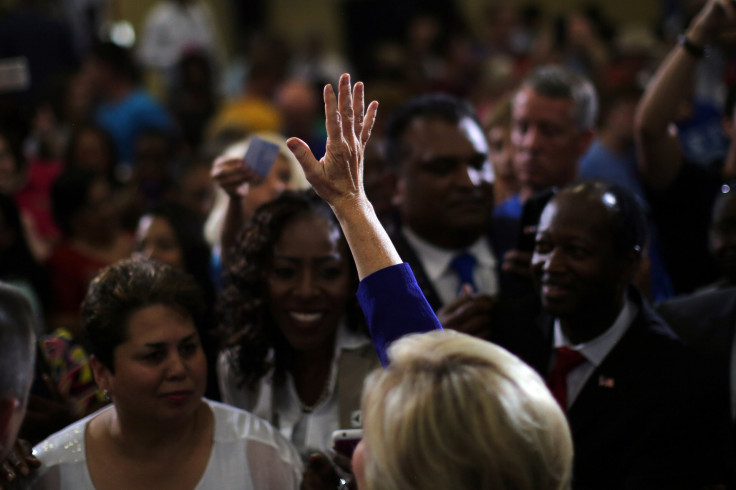Latest Presidential Polls: How Much Does The Black Vote Mean For Hillary Clinton, Donald Trump, Gary Johnson, Jill Stein?

Hillary Clinton was in Florida ahead of two separate rallies there Friday, and it's likely part of her agenda will include ramping up her rhetoric to appeal to black voters in the key swing state. It's for good reason, too.
Despite the overwhelming support she has received from the African-American community, especially compared to Republican presidential nominee Donald Trump, there appear to be valid fears black voters may not come out to the polls to support her on Election Day.
Florida is seemingly the most important of all the swing states, according to political pundits who keep citing President Barack Obama's presidential election success there in 2008 and 2012. Florida previously cost Democrats the White House in 2000 when George W. Bush edged then-Vice President Al Gore.
"I expect black vote to be down a little from 2012. It was a historical vote. But I don’t suspect it to go back to 2000 or 2004 levels,” Steve Schale, a former Obama campaign official in the state, told CBS News. "We don’t need it to be at 2012 levels we just need it to be close to that and I think it will be close to that."
Black voters in Florida heavily favor Clinton with 69 percent support, according to a CBS poll released this week. But African-American Floridians elected (and re-elected) Obama with about 95 percent support, a threshold Clinton likely needs to match in order to win the Sunshine State.
The voting bloc of 1.7 million black Floridians has been instrumental for Democratic candidates throughout modern history, but especially in the recent past, CBS News reported. "The black vote is the most cohesive vote in the whole state, and has been," said Susan McManus, a political analyst from the University of South Florida. "The margin of victory that black voters have given Democrats in the last three election cycles have been huge compared to margins of victory within the Latino community or the white community."
An average of national polls taken by Politico found Clinton and Trump are nearly tied in the swing states of Florida, Nevada, North Carolina and Ohio. However, the Democratic presidential nominee is leading by a wide margin with heavy support from likely black voters, according to the most recent USC Dornsife/Los Angeles Times "Daybreak" tracking poll. More than 74 percent of African-Americans nationwide are on Team Hillary, but questions linger over their true satisfaction with her track record in advocating for black people.
“You cannot win this election without the African American vote,” L. Douglas Wilder, the former governor of Virginia who is the first African-American in the U.S. elected to serve in that post, told the Washington Post last week. “Hillary obviously has the necessary qualifications. … But tell me how what you’ve done relates to what (the black community) needs.”
While Clinton was enjoying a slim lead over Trump nationally, the billionaire candidate was ahead in states with scant black populations. Iowa, for example, has voted for a Democratic candidate six out of the last seven presidential elections, according to the Hill. This election, however, Five Thirty Eight found the state is skewing Republican by a margin of 4 percentage points. Early voting in Iowa officially got underway Thursday.
Another likely concern for Clinton's campaign is Trump's reported recent 20 percentage point surge in support among black voters, something that News One's Roland Martin said could be an issue for the Democrat in other swing states. "If they don’t get serious about driving Black votes hard in Florida, North Carolina, as well as Ohio, they may have serious problems," Martin said about Clinton's campaign this week.
When factoring third party candidates into the presidential polling equation, Trump's campaign placed third behind Green Party nominee Jill Stein but ahead of Libertarian nominee Gary Johnson with African-American voters. Just 3 percent of likely black voters across the nation were supporting the Republican in the Washington Post poll released earlier this month. Johnson and Stein garnered similarly lackluster polling numbers among blacks, with 2 percent and 4 percent, respectively.
© Copyright IBTimes 2025. All rights reserved.






















